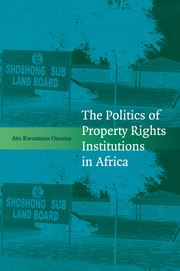Book contents
- Frontmatter
- Contents
- List of Maps and Tables
- Acknowledgments
- List of Abbreviations and Acronyms
- 1 Map of Botswana
- 2 Map of Ghana
- 3 Map of Kenya
- 1 Divergent Attitudes Towards Property Rights Institutions
- 2 Explaining Institutional Choice and Change
- 3 Varying Responses by Ghanaian and Batswana State Leaders
- 4 Traditional Leaders Take Charge in Akyem Abuakwa and Ga
- 5 Building and Then Demolishing Institutions in Kenya
- 6 Endogenous Contributions to Institutional Change
- 7 Conclusion
- Appendix: Notes on Field Research
- Index
- References
7 - Conclusion
Published online by Cambridge University Press: 04 May 2010
- Frontmatter
- Contents
- List of Maps and Tables
- Acknowledgments
- List of Abbreviations and Acronyms
- 1 Map of Botswana
- 2 Map of Ghana
- 3 Map of Kenya
- 1 Divergent Attitudes Towards Property Rights Institutions
- 2 Explaining Institutional Choice and Change
- 3 Varying Responses by Ghanaian and Batswana State Leaders
- 4 Traditional Leaders Take Charge in Akyem Abuakwa and Ga
- 5 Building and Then Demolishing Institutions in Kenya
- 6 Endogenous Contributions to Institutional Change
- 7 Conclusion
- Appendix: Notes on Field Research
- Index
- References
Summary
INSTITUTIONAL CHOICE IN ZIMBABWE: TAKING THE ARGUMENT FURTHER AFIELD
How well does the argument laid out in this work account for how leaders handle property institutions in places beyond the cases considered in this work? In this chapter, we use Zimbabwe to test the ability of the theory constructed here to travel beyond the main cases considered in this work.
Zimbabwe is a good choice in part because it has become the “10,000-pound gorilla” in any discussion of the politics of property rights in Africa. Widespread media coverage of land occupations and political violence there has placed it in the center of discussions of property rights, democracy, and human rights around the world. Methodologically, it is a good selection because, like the other countries in this book, it was also colonized by Britain. In many ways, it is similar to Kenya. It experienced settler colonialism with the widespread expropriation of black land for exclusive European use, which resulted in a situation where “42% of the country was owned by 6000 (white) commercial farmers” at independence in 1980.
But the similarities between Zimbabwe and Kenya do not end there. As in Kenya, the seizure of lands for use by Europeans was accompanied by the construction of an institutional structure to facilitate the use of such land for commercial agriculture by Europeans. Also similarly to Kenya, title registration had taken deep root by the time of independence in 1980.
- Type
- Chapter
- Information
- The Politics of Property Rights Institutions in Africa , pp. 194 - 212Publisher: Cambridge University PressPrint publication year: 2009



